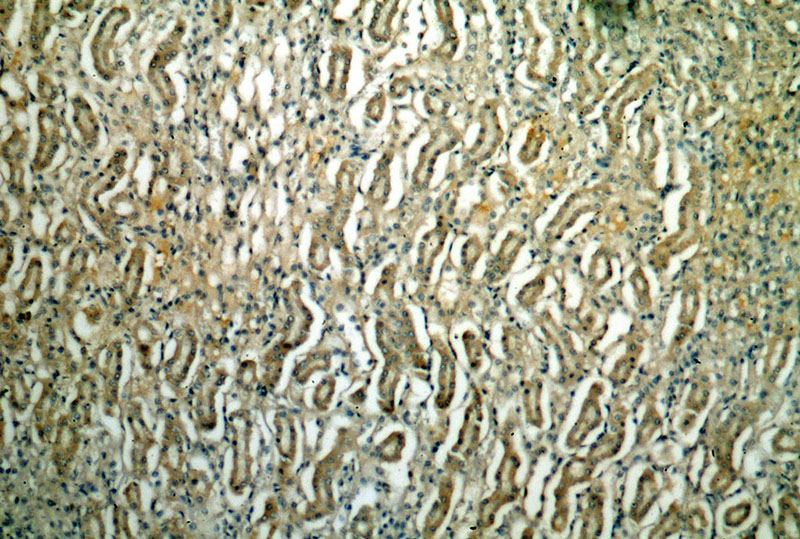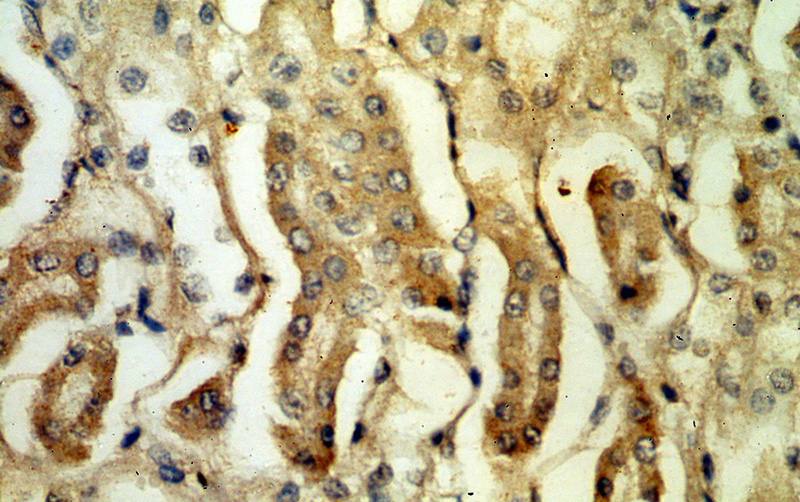-
Product Name
PLSCR3 antibody
- Documents
-
Description
PLSCR3 Rabbit Polyclonal antibody. Positive IHC detected in human kidney tissue, human skeletal muscle tissue.
-
Tested applications
ELISA, IHC
-
Species reactivity
Human; other species not tested.
-
Alternative names
phospholipid scramblase 3 antibody; PL scramblase 3 antibody; PLSCR3 antibody
-
Isotype
Rabbit IgG
-
Preparation
This antibody was obtained by immunization of Recombinant Protein (Accession Number: NM_020360). Purification method: Protein A purified.
-
Clonality
Polyclonal
-
Formulation
PBS with 0.1% sodium azide and 50% glycerol pH 7.3.
-
Storage instructions
Store at -20℃. DO NOT ALIQUOT
-
Applications
Recommended Dilution:
IHC: 1:20-1:200
-
Validations

Immunohistochemical of paraffin-embedded human kidney using Catalog No:114013(PLSCR3 antibody) at dilution of 1:50 (under 10x lens)

Immunohistochemical of paraffin-embedded human kidney using Catalog No:114013(PLSCR3 antibody) at dilution of 1:50 (under 40x lens)
-
Background
PLSCR3, also named as PLS3, belongs to the phospholipid scramblase family. It may mediate accelerated ATP-independent bidirectional transbilayer migration of phospholipids upon binding calcium ions that results in a loss of phospholipid asymmetry in the plasma membrane. PLSCR3 may play a central role in the initiation of fibrin clot formation, in the activation of mast cells and in the recognition of apoptotic and injured cells by the reticuloendothelial system. It is a target of protein kinase C-δ (PKC-δ), resides in mitochondria and plays pivotal roles in regulating apoptotic response. Phosphorylation of PLSCR3 by PKC-δ is involved in the hyperthermia-induced apoptotic signal transduction pathway in Tca8113 cells, and that Hsp27 blocks this pathway to suppress hyperthermia-induced apoptosis. (PMID:20569108)
-
References
- Jiang W, Bian L, Ma LJ, Tang RZ, Xun S, He YW. Hyperthermia-induced apoptosis in Tca8113 cells is inhibited by heat shock protein 27 through blocking phospholipid scramblase 3 phosphorylation. International journal of hyperthermia : the official journal of European Society for Hyperthermic Oncology, North American Hyperthermia Group. 26(6):523-37. 2010.
Related Products / Services
Please note: All products are "FOR RESEARCH USE ONLY AND ARE NOT INTENDED FOR DIAGNOSTIC OR THERAPEUTIC USE"
